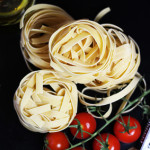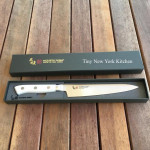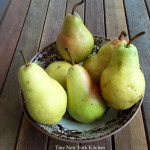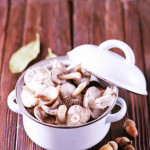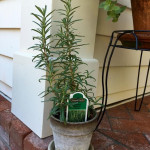Red Split Lentils
The lentil is one of our oldest foods and a staple in many countries around the world. It originated in Asia and North Africa, and continues to be cultivated in those regions, as well as in France and Italy. Lentils are hard even when fresh, so they are always sold dried.
Lentils are a good source of complex carbohydrates and plant protein. They also contain a range of vitamins and essential minerals, including iron, selenium, folate, manganese, zinc, phosphorus and some B vitamins.
Orange-colored red split lentils, sometimes known as Egyptian lentils, are the most familiar variety. They cook relatively quickly, in just 20 to 30 minutes, eventually disintegrating into a wonderful thick, rich purée. They are ideal for thickening soups and casseroles. When cooked with spices, garlic, and onions they make a hot and delicious dhal, a richly flavored purée served as an accompaniment to meat or vegetable curries. In the Middle East, red or yellow lentils are cooked and mixed with spices and vegetables to form balls known as kofte, which are then fried.
“Work With What You Got!”
© Victoria Hart Glavin Tiny New York Kitchen © 2016 All Rights Reserved
Cooking Pasta
There is no salt in pasta dough, so make sure to put enough salt in the cooking water. Use plenty of water, which should be about 4 quarts per 1 pound of pasta. Because salt actually slows down the rate at which water comes to a boil, add salt after the water is boiling. Use a heaping teaspoon for every quart of water. If you don’t think that you have enough salt in the water, then taste it, and you should be able to detect the salt.
I like to serve pasta from a warmed serving bowl. Place the bowl in the sink and set the colander inside of the bowl. Drain the pasta, letting the water drain into the bowl. Lift up the pasta in the colander, give it a good shake to drain further, and then pour the pasta into the still warm cooking pot. Make sure to NEVER rinse the pasta. This is a big no no. Then add the sauce to the pasta, in the cooking pot, and combine. Pour out the water from the serving bowl. I always reserve a cup or two of the pasta water in case I want to thin out the sauce a bit. Dry the bowl and transfer the pasta to the warm bowl and serve. It’s that easy.
“Work With What You Got!”
© Victoria Hart Glavin Tiny New York Kitchen © 2016 All Rights Reserved
Japanese Zanmai Knives Are Some Of My Favorite Knives. It’s always a fabulous day when I get a new knife, but of course I always cut myself straight away. It’s like christening the new knife I suppose, which is why I keep a stack of bandages on the windowsill above the kitchen sink.
I tend to think that the Japanese made knives are far superior to the German made knives. Beyond the essentials, build your collection of knives based on the kind of cooking you like to do. If you roast meat a lot, then a carving knife may be more necessary than a thin-bladed vegetable cleaver.
Start With: 8 Inch Chef’s Knife, 3 1/2 Inch Paring Knife, 9 Inch Serrated Bread Knife
Add: 10 Inch Chef’s Knife, 5 1/2 Inch Santoku Knife (Ceramic Or Metal), Kitchen Shears
Nice To Have: Boning Knife, 9 Inch Carving Knife, Thin Bladed Vegetable Cleaver, Serrated Tomato Knife, 4 Inch Paring Knife.
I often give knives, to people who love to cook, as gifts. Cooking is so much more joyous when you’re doing it with a fabulously sharp knife.
“Work With What You Got!”
© Victoria Hart Glavin Tiny New York Kitchen © 2016 All Rights Reserved
Dried Beans
Purchase dried beans from a source with good turnover. When I’m travel to Tucson I love to stock up on dried beans from Native Seeds, who have a nice selection of beautiful beans (http://shop.nativeseeds.org/collections/beans) The longer the beans are on the shelf, the drier they become, and the longer they will take to cook. If you’ve ever cooked beans that just wouldn’t become tender, they were probably too old. Once you have them home, store them in an airtight container in a cool dark place.
Soaking dried beans reduces the cooking time and helps the beans hold their shape better during cooking. Although soaking isn’t necessary, the shortened cooking time cuts energy use, which is a good enough reason to soak. Spread the beans on a large baking sheet, and sort through them to remove stones or broken beans. Transfer the beans to a bowl and add enough cold water to cover by an inch or two. Let stand for 2 hours; longer will shrivel the beans. Drain before using.
For a quicker soaking method, place the sorted beans in a large saucepan, add cold water to cover, and bring to a full boil. Immediately remove from the heat and cover. Let stand for 1 hour, and then drain before using.
Cooks are divided over when to salt a pot of cooking beans. Some people believe that salting toughens the beans and thus lengthens their cooking time. Others believe that if beans are salted toward the end of cooking, the flavor is dull. So, in the interest of proper seasoning, go ahead and add a reasonable amount of salt at the beginning of cooking (about 1/2 teaspoon per cup of dried beans), as the add cooking time is minimal.
www.tinynewyorkkitchen.com
“Work With What You Got!”
© Victoria Hart Glavin Tiny New York Kitchen © 2016 All Rights Reserved
Even though it is now officially autumn I’m planting flowers. It makes my heart happy to see the leaves turning colors and the beautiful flowers that I’ve put into various pots. As much as I’m sorry to see summer leave, I welcome the cooler weather. Autumn has always been my favorite season as it’s the time of year when everything bursts with the last of its beauty. To me, it seems as if nature has been saving up all year for her grand finale. Winter will be certainly be here soon enough, which brings its own beauty.
“Work With What You Got!”
© Victoria Hart Glavin Tiny New York Kitchen © 2016 All Rights Reserved
Rosh Hashanah
Rosh Hashanah is the Jewish New Year (the first day of the Jewish High Holy Days) and is also known as the Feast of Trumpets. The holiday , which is also a day of remembrance, is at once solemn and festive. Joy comes not only from trust in God’s compassion, but also the anticipation of renewal and fresh starts.
The Rosh Hashanah meal becomes more than mere rejoicing as it is also a form of prayer. The table is transformed into an altar to supplicate God, partaking of symbolic foods: honeyed and sugared treats for a sweet year; round foods for a fulfilled year, unbroken broken by tragedy; foods that grow in profusion at this season and those eaten in abundance, such as rice, signifying hopes for fecundity, prosperity, and a wealth of merits.
Dinner begins with a prayer for a sweet year, dipping challah, or other sweet bread, and apples into fragrant honey. Some start with sugared pomegranates, dates, figs, or quince in rose petal syrup.
It is customary for the first course to be fish, which symbolizes fertility and God’s blessings. Seasonal vegetables like leeks, Swiss chard, black-eyed peas, and pumpkins appear throughout the meal in major and supporting roles. Delicious main dishes follow, and usually two or more sweet desserts (such as a plum tart, honey cake, or noodle kugel) conclude the meal.
A few foods, however, are unwelcome at the Rosh Hashanah table. Many Ashkenazi Jews do not eat nuts (because the numerical value of the Hebrew word for nuts is equal to the value of the word for sin). Others do not eat pickles, horseradish, or other sour foods, while Moroccans avoid foods that are black, like olives and grapes (which are considered bad omens).
“Work With What You Got!”
© Victoria Hart Glavin Tiny New York Kitchen © 2016 All Rights Reserved
Pears
Season: June to October, but can be cold-stored until spring.
Pears are one of the few fruits that should be picked when under ripe. Buy hard pears a few days before you need them, and let them ripen at room temperature until they have a slight yield when given a gentle squeeze.
To core a pear, cut the pear in half lengthwise, and then scoop out the hard portions with a melon baller. Pear flesh (like apple) oxidizes when exposed to air, so rub the cut areas with lemon juice or white wine to keep them from turning brown.
“Work With What You Got!”
© Victoria Hart Glavin Tiny New York Kitchen © 2016 All Rights Reserved
“None of us are getting out of here alive, so please stop treating yourself like an after thought. Eat the delicious food. Walk in the sunshine. Jump in the ocean. Say the truth that you’re carrying in your heart like hidden treasure. Be silly. Be kind. Be weird. There’s no time for anything else.” – Christopher Walken
Make The Most Of Mushrooms
Keep fresh mushrooms in perfect condition after purchase. Here is what to do to make these gems last.
Keep The Original Store Packaging
You can’t see it, but the wrap on packaged mushrooms actually has tiny holes that prevent damaging condensation and gases from building up. You can, and should, store commercially grown mushrooms (presliced or whole) in their original container and wrap in the refrigerator, they will keep up to one week.
Keep Moisture At Bay, Wrap Loose Mushrooms In Dry Packaging
Storing mushrooms in a damp towel will shorten the length of time they stay fresh. Instead, refrigerator loose mushrooms in a brown paper bag; it will absorb any moisture and allow them to breathe. A partially opened ziplock plastic bag will also work.
Avoid The Crisper
The refrigerator’s vegetable bin is a moist place, not a friendly area for mushrooms. Instead, keep them in a spot where air can circulate, like an open shelf.
Keep Mushrooms Away From Pungent Foods
Mushrooms can take on the flavors of strong foods that are stored nearby. Keep them away from onions, garlic, and other foods with strong odors.
Rinse With Water
Clean mushrooms under cool, running water right before you’re ready to use them; then pat dry. It’s a myth that mushrooms easily absorb water, but if they’re rinsed too far in advance, they will discolor and deteriorate from the moisture. Cultivated mushrooms grow in sterilized compost, so you can also clean them by simply brushing any bits of dirt with a clean damp towel.
www.tinynewyorkkitchen.com
“Work With What You Got!”
© Victoria Hart Glavin Tiny New York Kitchen © 2016 All Rights Reserved
Growing herbs make cooking so much better. When the weather turns cold I bring them inside to my kitchen so they don’t freeze. Tonight I’m making grilled rosemary bone-in pork chops.


